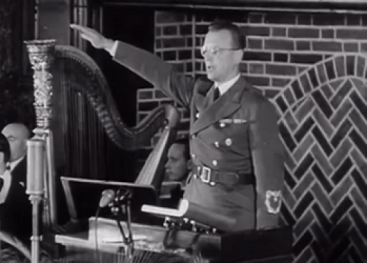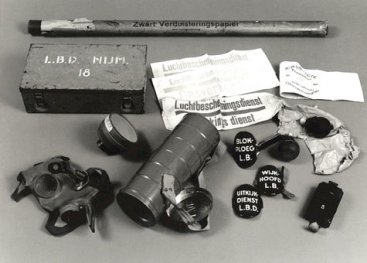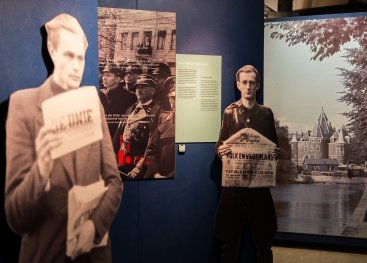
The February Strike
'No Jews Allowed'

In early 1941, the members of the NSB in Amsterdam developed an aggressive attitude towards the Jews. Members of the WA, the NSB's uniformed commando group, marched through Amsterdam. Stopping at cafés, they put up signs saying 'No Jews Allowed' and they destroyed property in the old Jewish neighbourhood.
Fights

windows of a Jewish café.
Jewish and non-Jewish young men formed commando groups to protect themselves, which resulted in fighting. In these fights, WA member Hendrik Koot was so seriously wounded that he died a few days later. In response, the Germans temporarily closed off the Jewish quarter. They set up a Jewish Council, which was supposed to help restore order. But a few days after Koot's funeral, the Jewish owner of an ice-cream parlour sprayed a German patrol with ammonia gas.
First roundups on Jews

The Germans used the incidents as an excuse for the first roundups on Jews: on February 22nd and 23rd 1941, 425 young Jewish men were rounded up, beaten and taken away. Many Amsterdam residents were shocked. The illegal Dutch Communist Party [CPN] called for a protest strike. On Tuesday February 25th, the trams stopped running. Everyone in the city noticed that something was going on. The strike caught on. More and more businesses took part. The strikers marched through the streets.
Salomon de Vries
Salomon de Vries wrote in his diary:
'The news ran round through the city. "The Amsterdam Dry-dock Company, the shipbuilding industry, De Vries Lenz, Fokker - they're on strike everywhere! The ferryboats aren't running! The trams aren't running!"'
'Empty streets. No trams, almost no cars. The workers and drivers of a very large number of shipping agents, large and small, had also laid down their work. Almost everywhere the shops were closed. Strike — a general strike! Against the persecution of the Jews, against inhumane treatment, against the "we're running the show" attitude of the WA and other Mussert gangsters.'


Mientje Meijer
Mientje Meijer worked in a sewing shop with many Jewish girls. Her husband was organising the tram strike. If the strike there caught on, Mien planned to close down the shop.
‘I kept walking to the window. Finally I saw him, and he nodded. I could feel my heart freeze. I looked into the shop and saw all those girls and the boss. I wasn’t at all accustomed to speaking before a group. I said, “Ladies, all of Amsterdam has come to a standstill because they’ve been rounding up Jews and taking them away. We’ve got to join in.” To my surprise everyone took to the streets. I thought, “now I’m going to be sacked,” but even the boss went along! We went to the Noordermarkt and the procession just kept growing. It was overwhelming.’
The next day, the strike spread to outlying towns. The Germans were taken by surprise. They abandoned their friendly attitude and reacted harshly, shooting at groups of strikers. Nine people were killed and hundreds of strikers arrested. On March 13th, three of the February strikers and 15 members of a resistance group were executed in the dunes. These were the first death sentences to be carried out. The reports made a deep impression in the Netherlands.
Semmy Woortman
Semmy Woortman, leather stitcher in a handbag factory, Amsterdam, tells of the second day of strikes:
'In the morning somebody from the communists came to the place I was working and said, "We're going on strike against the persecution of the Jews. Will you join us?" So we did.
I remember the chaos. On the Bilderdijkkade a young man who happened to be cycling by was just shot dead. I saw his brains splatter onto a tree. The Germans were beside themselves with anger. Later on, our boss had to report anyone who had gone on strike. He asked us, "Nobody here was on strike, right?". He didn't report anyone.'


Coba's typewriter
Coba was a member of the CPN. She had the typewriter before the war. In 1940, the party gave her a stencilling machine to produce pamphlets. On the second day of the strike, she was arrested while handing out pamphlets. Her son says: ‘Those policemen were okay. They took her bag away and when they gave it back there was only one pamphlet left in it, so she could say it had been pushed in her hands.’ But Coba was not released. She survived Camp Ravensbrück.
The February strike did not prevent further persecution of the Jews. But as a mass protest demonstration against the persecution of the Jews, the strike was unique. It strengthened the disgust for National Socialism in the Netherlands. The mood became more grim.

